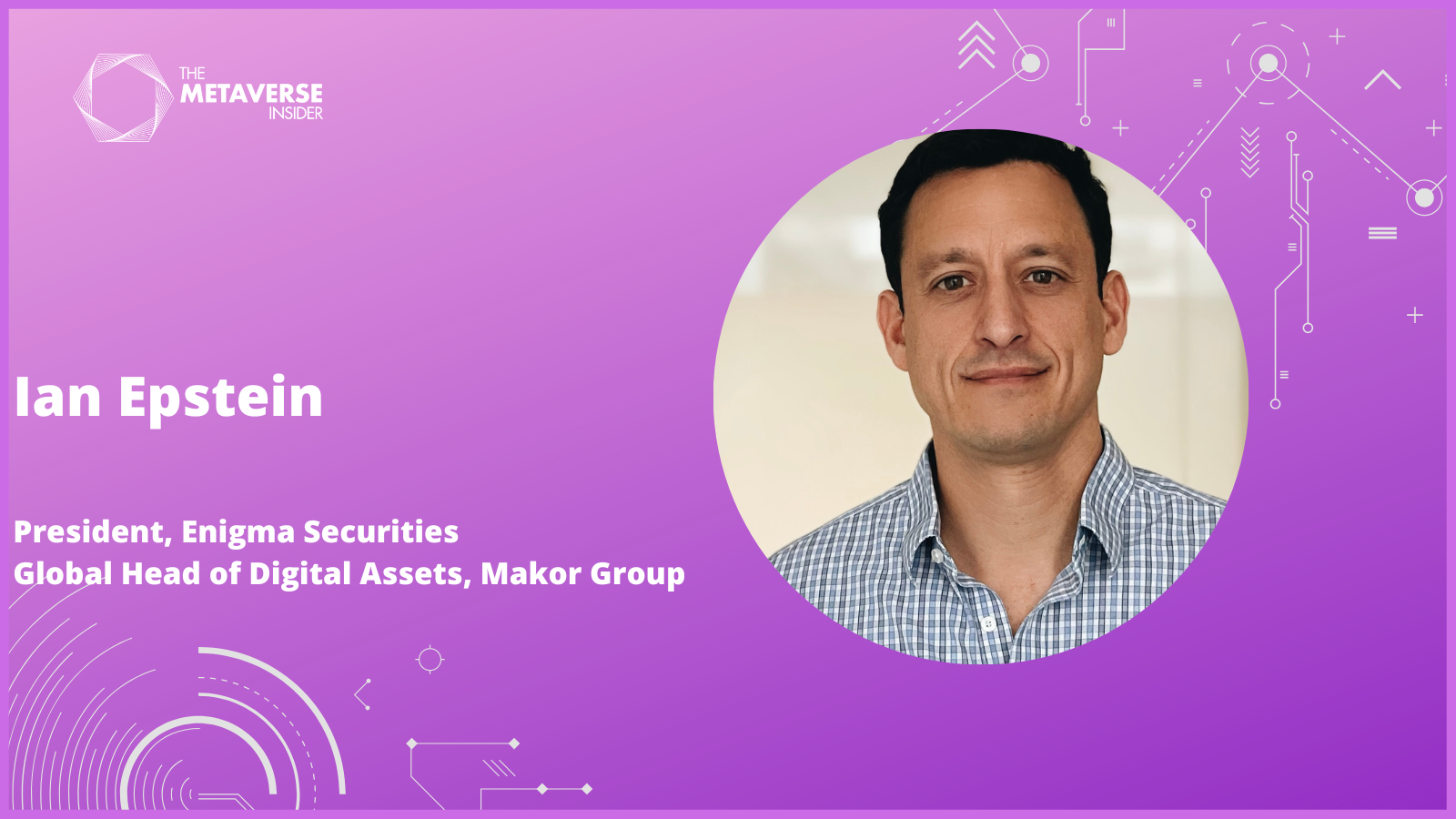Earlier this month, I was attending Consensus in Austin. I had an opportunity to meet and interview some popular personalities like Paul Brody, Marieke Flament, and Jason Brink. This event also presented an opportunity to meet Ian Epstein.
While I was unaware of Ian before the conversation, this ended up being an extremely insightful interview. This conversation with Ian covers the impact of Decentralized Finance, the future of NFTs and much more.
This interview gives the perspective of someone who has spent a significant amount of time in Private Equity, Hedge Funds, and trading. As we are in a bear market, it is an excellent chance to read where the market is heading from an experienced investor’s perspective.

My first question to Ian was about his background and Enigma Securities.
“Enigma is a wholly owned subsidiary of the Makor Group. In 2017, (Makor) built Enigma securities, a fully regulated, FCA regulated digital broker, dealer, and advisory investment bank business.”
“We are uniquely positioned to trade both digital and traditional assets, I have a traditional background, having spent my seven years in China doing private equity, and then almost 15 years in New York, as a hedge fund manager, and trader, and a couple of very well known hedge funds. I was a client of the Makor Group macro business.”
“Thus, I became familiar with the unique value add proposition that the group brings to clients. I first was brought on to work more closely in our macro business. As it became apparent that the growth of our digital business would be important in its own right and significant for the rest of the group, I’ve transitioned now to being the CEO of Enigma, and the Global Head of digital assets at Makor Group.”
“As the global head of digital assets at the Makor Group, I work with a number of our traditional clients who have digital mandates; to think about what it means to have a digital mandate and the way in which the digitization of finance beyond the cryptographic advances around Bitcoin will impact their firms.”
“As a CEO of Enigma, there’s a number of focuses, our clients are both corporate, think miners, ATMs, credit card companies, tokenization, platforms, etc. and financial hedge funds, digitally native hedge funds, directed IRAs, pension plans, platform asset managers. We provide a whole host of execution services, research, technology solutions, and advisory.”
Indeed, Ian is well established in this industry. As someone with a traditional finance background, I asked Ian about his opinion on the Decentralized Finance space and its adoption.
“I think what DeFi has shown is that we have a number of new financial tools, both from a technology perspective, and from a theoretic use case perspective. But those are just tools of finance.”
“We shouldn’t forget that the purpose of finance to finance something. Finance built just to finance finance is not very good finance. Finance built to finance intellectual property, research and development, assets, equity, fixed income, and commodity, that’s the purpose of finance.”
And so, what we have in DeFi our new tools to finance. And the question that myself and others like me in the space, need to answer now is what we are going to finance.”
“These DeFi tools enable the financing of new asset classes, to live liquification of assets, where that had previously been too expensive or complex to do. I think that’ll be the exciting piece. It’s not DeFi for the sake of DeFi. It’s never finance for the sake of finance! The question is, what are we going to finance? And I think in the next year, what we are going to find is that these tools are used to finance a whole new host of assets, be they and forms of property, be they intellectual or physical.”
This was a very insightful response by Ian. As the popularity of DeFi increases, perhaps an essential determining factor of the success of new projects will be what is the function of those projects. What is the problem that the project is solving?
Next, I asked Ian which sectors of finance will DeFi affect the most.
“All! I think what we’ve seen so far is if we break asset classes down into real estate, fixed income, equity, intellectual property, currency, commodity, the asset class that obviously has seen the most advancement through digitization is in the currency side. Well, what we’ll see now is that moving to other asset classes.”
“What we’ll see is the liquification of fixed assets, through real time securitization. What we will see is the digitization of commodities. What we will see is the digitization of equity or equity-like synthetics, that mean that markets can be open 100% of the time, not just 25% of the time.”
What we will see is the digitization of property in a new way. Ultimately, the internet wins!”
Next, I switched focus to NFTs. NFTs are used as an investment tool by many recent investors in this space. I asked Ian about what he thinks is the future of NFTs.
“Far more around utility NFTs. People will have different views on value of art. People have different views around community and the value of showing your part of community.”
“Clearly, anybody could have sold sugar water. But Coca Cola had a much bigger margin. So, there’s a lot of value associated with brand. And there’s no shortage of academic studies on the financial value of tribalism. And so that’s what we’ve seen a lot in the NFT space.
“But I think where we will see financial and intellectual capital flocked to is utility NFTs. NFTs is that not only integrate community, but finance, real product and real service, in a way to prefund projects, in a way to make use of those projects.”
I wanted to focus on specific industries that NFTs could impact. So I asked Ian if he thinks NFTs will have an effect on Real Estate.
“NFT’s will be used in a way to represent ownership. Of course. Real time securitization is something that is a key theme of ours, and of mine as we look forward, and I believe that that will have a tremendous impact on real estate.”:
Still using Real Estate as an example, I wanted to learn how NFTs or DeFi will affect traditional industries. Thus, I proceeded to ask him how will it get impacted. Perhaps, the role of middlemen like Real Estate agents will not be needed?
“Well, certainly title insurance is silly in a world where we should have better trust mechanisms. So, for instance, that would be something that if all title was on chain, the idea of title insurance would be less necessary.
“Real estate agents do a couple things. They aggregate prices. And we’ve seen Zillow and technologies like that do away with it. But they also advise people. And so, as information becomes more ubiquitous, and the aggregation of information, which is perfectly web2 type concept, it’s proven very successful.
“We’ve seen technology influence stakeholders, but there will still be room for people with expertise, there will still be room for people with advice.”
“Whether they have the same gross margins in their industry, that’s yet to be determined. But gross margins and profitability are not always the same thing. So, there may still be very profitable intermediaries. They just may not take his big bite of the apple.”
Perhaps, this answer by Ian perfectly explains the concept around DeFi, web3, and blockchain technology. While there will still be room for advisors and intermediaries, they may not be able to have the same profit margins.
So, in the end, I wanted to conclude my interview with Ian by asking about the bear market. Ian has been involved in TradFi for an extended period, and I believe he must have seen some bear markets before. Thus, I wanted to get his opinion on what will be the future of all these new companies and technologies that we were witnessing at Consensus.
“I think we’ll see a quilt, if you will, of multiple L1s (layer 1s). And those are ones which are built purposefully to solve for slightly different needs.”
“Bitcoin is not built for the same thing as Ethereum. Ethereum is not built in the same way as Helium. And they’re not built in the same way as Algorand. Each one of these has really good use cases. They have only scratched the surface of the market that they will cater to and become hugely relevant.”
“I think that in this patchwork, there’s going to need to be ways in which these networks integrate with one another. There’s a lot of work being done on that. It’ll have to be done safer. It’ll have to be done better. That’ll happen as there is a tremendous amount of human capital has been put into the space. It would be shocking if it wasn’t successful.”
“I think one should query whether or not the cryptography is the more interesting piece or the digitization is the more interesting piece. What I think has to happen in the next year is we built a lot of infrastructure. We’ve built the built the railroads, but we need to put the rail car.
“We need to put the trains on those tracks. We need digital assets. We need the digitization of assets, to now be put onto those that infrastructure to be put through that plumbing to take us the next step forward. We have really good technology for very different network use cases. Now we need to use those use cases to do real things that affect people in a significant way. And we think that that’s gonna happen in the next year!”
Ian had given a very positive answer to a rather depressing question. It is excellent to hear blockchain technology will develop, and it is time to work on its use cases. This is a great reason to become more involved in this space despite a bear market.
Digital Twin Insider would like to thank Ian for taking the time for an interview during a jam-packed Consensus event. He provided great insight into what we can expect in the market and how we expect the industry to progress.
If you found this article to be informative, you can explore more current Digital Twin news here exclusives, interviews, and podcasts.













